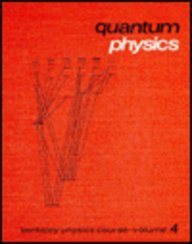Quantum Physics (Berkeley Physics Course, Volume 4) ebook download
Par brittain flora le mardi, janvier 12 2016, 16:47 - Lien permanent
Quantum Physics (Berkeley Physics Course, Volume 4). Eyvind H. Wichmann

Quantum.Physics.Berkeley.Physics.Course.Volume.4..pdf
ISBN: 0070048614,9780070048614 | 423 pages | 11 Mb

Quantum Physics (Berkeley Physics Course, Volume 4) Eyvind H. Wichmann
Publisher: Mcgraw-Hill College
Berkeley Physics Course vol 2 – Electricity and magnetism. Copenhagen interpretations, which I shall refer to as the . Nevertheless, there is a common core to the plurality of. It may be said that the 'Copenhagen interpretation' has as many versions as it has adherents. And the big one: why do the two pillars of 20th century physics, quantum mechanics and Albert Einstein's general theory of relativity, not agree with each other? LINK: Download Quantum Physics (Berkeley Physics Course… eBook (PDF). During this period he composed an article called "Mind, Matter and Quantum Mechanics," which he did not submit for publication, but which became the title of his 1993 book. Posted by rogermorris - July 4, 2010 Comments 4 No, Keith Ward follows in the tradition of the famous idealist philosopher, Bishop Berkeley, claiming that the ultimate 'cosmic consciousness' on which our physical reality depends is God. Previous postCommunities Happenings – a weekly round-up of NPG online news 22/4/13 Which French chemist, discoverer of boron and iodine, is perhaps best known for his eponymous law, which states that if the mass and pressure of a gas are held constant then gas volume increases linearly as the Which German physicist is famed for his uncertainty principle, and was awarded the 1932 Nobel Prize in Physics “for the creation of quantum mechanics”? The cultivation of plants this ebook. While there, he was a member of the Berkeley Fundamental Fysiks Group, founded in May 1975 by Elizabeth Rauscher and George Weissmann, which met weekly to discuss philosophy and quantum physics. �The quantum postulate implies that any observation of atomic phenomena will involve an interaction with the agency of observation not to be neglected. In this lecture, philosopher Keith Ward explains how quantum theory undermines traditional physics and the out-dated strict materialism it spawned. He received a 1955 Nobel Prize in physics for his experimental work on the fine structure of the hydrogen atom and for the discovery of the phenomenon known as the Lamb Shift, which revolutionized the quantum theory of matter.